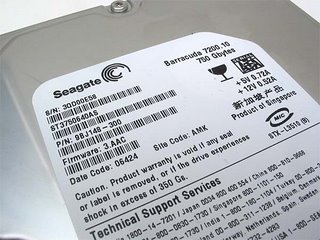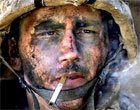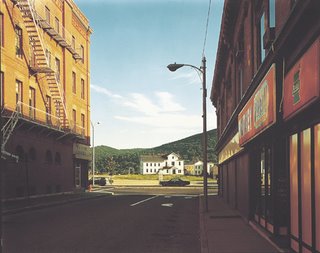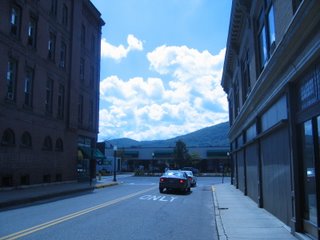Tuesday, May 30, 2006
That's a LOT of Storage Space

Seagate Systems today announced a 750GB hard drive.
That's more than twice the size of the biggest drive currently sold.
Imagine how the information landscape could change once drives like this become commonplace. That's an incredible amount of data storage and accessability available to the average user.
Monday, May 29, 2006
James McMurtry tune
"We Can't Make It Here"
by James McMurtry
There's a Vietnam Vet with a cardboard sign
Sitting there by the left turn line
Flag on his wheelchair flapping in the breeze
One leg missing and both hands free
No one's paying much mind to him
The V.A. budget's just stretched so thin
And now there's more coming back from the Mideast war
We can't make it here anymore
That big ol' building was the textile mill that fed our kids and it paid our bills
But they turned us out and they closed the doors
We can't make it here anymore
See those pallets piled up on the loading dock
They're just gonna sit there 'til they rot
'Cause there's nothing to ship, nothing to pack
Just busted concrete and rusted tracks
Empty storefronts around the square
There's a needle in the gutter and glass everywhere
You don't come down here unless you're looking to score
We can't make it here anymore
The bar's still open but man it's slow
The tip jar's light and the register's low
The bartender don't have much to say
The regular crowd gets thinner each day
Some have maxed out all their credit cards
Some are working two jobs and living in cars
Minimum wage won't pay for a roof, won't pay for a drink
If you gotta have proof just try it yourself Mr. CEO
See how far $5.15 an hour will go
Take a part time job at one your stores
Bet you can't make it here anymore
There's a high school girl with a bourgeois dream
Just like the pictures in the magazine
She found on the floor of the laundromat
A woman with kids can forget all that
If she comes up pregnant what'll she do
Forget the career, forget about school
Can she live on faith? Live on hope?
High on Jesus or hooked on dope
When it's way too late to just say no
You can't make it here anymore
Now I'm stocking shirts in the Wal-Mart store
Just like the ones we made before
'Cept this one came from Singapore
I guess we can't make it here anymore
Should I hate a people for the shade of their skin
Or the shape of their eyes or the shape I'm in
Should I hate 'em for having our jobs today
No I hate the men sent the jobs away
I can see them all now, they haunt my dreams
All lily white and squeaky clean
They've never known want, they'll never know need
Their shit don't stink and their kids won't bleed
Their kids won't bleed in their damn little war
And we can't make it here anymore
Will work for food will die for oil
Will kill for power and to us the spoils
The billionaires get to pay less tax
The working poor get to fall through the cracks
So let 'em eat jellybeans let 'em eat cake
Let 'em eat shit, whatever it takes
They can join the Air Force, or join the Corps
If they can't make it here anymore
So that's how it is, that's what we got
If the president wants to admit it or not
You can read it in the paper, read it on the wall
Hear it on the wind if you're listening at all
Get out of that limo, look us in the eye
Call us on the cell phone tell us all why
In Dayton Ohio or Portland Maine
Or a cotton gin out on the great high plains
That's done closed down along with the school
And the hospital and the swimming pool
Dust devils dance in the noonday heat
There's rats in the alley and trash in the street
Gang graffiti on a boxcar door
We can't make it here anymore
by James McMurtry
There's a Vietnam Vet with a cardboard sign
Sitting there by the left turn line
Flag on his wheelchair flapping in the breeze
One leg missing and both hands free
No one's paying much mind to him
The V.A. budget's just stretched so thin
And now there's more coming back from the Mideast war
We can't make it here anymore
That big ol' building was the textile mill that fed our kids and it paid our bills
But they turned us out and they closed the doors
We can't make it here anymore
See those pallets piled up on the loading dock
They're just gonna sit there 'til they rot
'Cause there's nothing to ship, nothing to pack
Just busted concrete and rusted tracks
Empty storefronts around the square
There's a needle in the gutter and glass everywhere
You don't come down here unless you're looking to score
We can't make it here anymore
The bar's still open but man it's slow
The tip jar's light and the register's low
The bartender don't have much to say
The regular crowd gets thinner each day
Some have maxed out all their credit cards
Some are working two jobs and living in cars
Minimum wage won't pay for a roof, won't pay for a drink
If you gotta have proof just try it yourself Mr. CEO
See how far $5.15 an hour will go
Take a part time job at one your stores
Bet you can't make it here anymore
There's a high school girl with a bourgeois dream
Just like the pictures in the magazine
She found on the floor of the laundromat
A woman with kids can forget all that
If she comes up pregnant what'll she do
Forget the career, forget about school
Can she live on faith? Live on hope?
High on Jesus or hooked on dope
When it's way too late to just say no
You can't make it here anymore
Now I'm stocking shirts in the Wal-Mart store
Just like the ones we made before
'Cept this one came from Singapore
I guess we can't make it here anymore
Should I hate a people for the shade of their skin
Or the shape of their eyes or the shape I'm in
Should I hate 'em for having our jobs today
No I hate the men sent the jobs away
I can see them all now, they haunt my dreams
All lily white and squeaky clean
They've never known want, they'll never know need
Their shit don't stink and their kids won't bleed
Their kids won't bleed in their damn little war
And we can't make it here anymore
Will work for food will die for oil
Will kill for power and to us the spoils
The billionaires get to pay less tax
The working poor get to fall through the cracks
So let 'em eat jellybeans let 'em eat cake
Let 'em eat shit, whatever it takes
They can join the Air Force, or join the Corps
If they can't make it here anymore
So that's how it is, that's what we got
If the president wants to admit it or not
You can read it in the paper, read it on the wall
Hear it on the wind if you're listening at all
Get out of that limo, look us in the eye
Call us on the cell phone tell us all why
In Dayton Ohio or Portland Maine
Or a cotton gin out on the great high plains
That's done closed down along with the school
And the hospital and the swimming pool
Dust devils dance in the noonday heat
There's rats in the alley and trash in the street
Gang graffiti on a boxcar door
We can't make it here anymore
I Found this Really Cool Radio Station
It's WHAY 98FM in Whitley City, Kentucky. They broadcast online. The music is roots/Americana and the deejays are pretty hip, in a down-home sort of way. Highly recommended.
www.hay98.com
www.hay98.com
Thursday, May 25, 2006
Captain Joe Miron
Boy, talk about a mysterious character.
"Captain" Joe Miron was a bit of a mythic figure when I was younger. He was an artist, and a bartender. He painted the semi-famous mural on the wall of the Captain Kidd tavern in Woods Hole. I remember seeing him walking the beach in Falmouth Heights. Miron died many years ago, but I've suddenly gained a bit of a renewed interest in the man and his work because of two facts I've just discovered:
*Miron also painted the mural on the wall of the legendary Kelly Square Yacht Club, one of Worcester's oldest bars.

(The Kelly Sqare Yacht Club, part of the Hotel Vernon, is on the first floor of the yellowish building seen in this picture.)
*The other interesting fact: Carly Simon is a huge fan of Miron's art and an avid collector of his stuff.
The thing is, there's almost nothing on the internet about him. There's ANOTHER Joe Miron, who is apparently a sex advisor, which makes for some interesting search results, but next to nothing on the original Captain Joe.
I'll run a Lexis/Nexus search on him as soon as I have an opportunity. That should turn up something more on him.
"Captain" Joe Miron was a bit of a mythic figure when I was younger. He was an artist, and a bartender. He painted the semi-famous mural on the wall of the Captain Kidd tavern in Woods Hole. I remember seeing him walking the beach in Falmouth Heights. Miron died many years ago, but I've suddenly gained a bit of a renewed interest in the man and his work because of two facts I've just discovered:
*Miron also painted the mural on the wall of the legendary Kelly Square Yacht Club, one of Worcester's oldest bars.

(The Kelly Sqare Yacht Club, part of the Hotel Vernon, is on the first floor of the yellowish building seen in this picture.)
*The other interesting fact: Carly Simon is a huge fan of Miron's art and an avid collector of his stuff.
The thing is, there's almost nothing on the internet about him. There's ANOTHER Joe Miron, who is apparently a sex advisor, which makes for some interesting search results, but next to nothing on the original Captain Joe.
I'll run a Lexis/Nexus search on him as soon as I have an opportunity. That should turn up something more on him.
Sunday, May 21, 2006
Great Article from the L.A. Times

Iconic Marine Is at Home but Not at Ease
Blake Miller's weary gaze hinted at the psychological pain to come
By David Zucchino
Times Staff Writer
May 19, 2006
JONANCY, Ky. — Growing up in Jonancy Bottom, where coal trucks grind their gears as they rumble down from the ragged green hills, Blake Miller always believed there were only two paths for him: the coal mines or the Marine Corps. He chose the Marines, enlisting right out of high school.
The Marines sent him to Iraq, and then to Fallouja, where his life was forever altered. He survived a harrowing all-night firefight in November 2004, pinned down on a rooftop by insurgents firing from a nearby house. Filthy and exhausted, he had just lighted a Marlboro at dawn when an embedded photographer captured an image that transformed Blake into an icon of the Iraq war.
His detached expression in the photo seemed to signify different things to different people — valor, despair, hope, futility, fear, courage, disillusionment. For Blake, the photograph represents a pivotal moment in his life: an instant when he feared he would never see another sunrise, and when his psychological foundation began to fracture.
Blake, whose only brush with celebrity was as a star quarterback in high school, became known as the Marlboro Man, a label he detests. That same notoriety has carried over into his post-Iraq life, where he is an icon of sorts for another consequence of the war — post-traumatic stress disorder, or PTSD.
On Nov. 10, precisely one year after the photograph was flashed around the world, Lance Cpl. James Blake Miller was medically discharged from the Marine Corps, diagnosed with full-blown PTSD. Three years after leaving the Kentucky hills for a career in the Corps, he was back home. He feels adrift and tormented, dependent on his new bride, his family and his military psychiatrist to help him make sense of all that has befallen him.
He barely sleeps. On most mornings, Blake says, he has no good reason to get out of bed. Often, his stomach is so upset that he can't eat. He has nightmares and flashbacks. He admits that he's often grouchy and temperamental. He knows he drinks and smokes too much.
"He's not the same as before," said Blake's wife, Jessica, who has known him since grade school. "I'd never seen the anger, the irritability, the anxiety."
Blake says he feels guilty about taking money — $2,528 in monthly military disability checks — for doing nothing. Yet he's also frustrated that two careers made possible by his military training, police officer or U.S. marshal, are out of reach because law enforcement is reluctant to hire candidates with PTSD.
So he broods, feeling restless and out of options: "I'm only 21. I'm able-bodied as hell, yet I'm considered a liability. It's like I had all these doorways open to me, and suddenly they all closed on me. It's like my life is over."
At a local restaurant one night last month, Blake became enraged when he thought a man was staring at Jessica's rear end.
"I just wanted to grab his hair and smash his head against the table," he said later. "I was ready to kill him." But he restrained himself, he said.
Jessica's grandmother, Willa Fouts, whom Blake calls Mamaw, patted his arm outside the restaurant and told him: "You've had a few episodes like that, Blake, where you're just so quick to anger. You need to try to calm yourself."
Jessica, who graduates this spring from Pikeville College with a psychology degree, has persuaded her husband to undergo visualization techniques in which she helps him confront his demons.
"It's understandable that Blake has PTSD, after all he's been through," she said. "Ordinary people can't comprehend what it's like to be constantly shot at and have to kill other human beings. They need to know what it means to send people like Blake out to fight wars. You're going to have a lot of people breaking."
Five other members of his platoon of about three dozen have been diagnosed with PTSD, Blake said. A dozen men from his unit were killed in action. A Journal of the American Medical Assn. study published in March found that more than a third of troops who served in Iraq sought help for mental health problems within a year of returning home.
Sitting in the couple's spacious apartment above a furniture store outside Pikeville, Jessica squeezed Blake's hand and told him: "You've gone through so much, baby, that you just broke."
Blake was staring at the sunrise. He was on a rooftop in Fallouja, sucking on a Marlboro and wondering whether he would live to see Jessica and his father and brothers again.
Luis Sinco, a Times photographer, was crouched next to the corporal, taking cover behind a rooftop wall. There was a break in the all-night firefight after an Abrams tank, radioed in by Blake, destroyed a house filled with insurgents.
Sinco pressed the shutter.
He did not consider the image particularly special. It was the last shot he filed that day.
The photo appeared Nov. 10, 2004, and was distributed worldwide by the Associated Press. More than 100 newspapers published it. TV and cable networks aired feature stories about the Marine's lost, distant look. Some noted the trickle of blood on his nose — caused not by enemy fire, but by Blake's rifle sight when it bumped his face.
Blake was unaware that Sinco had photographed him. Two days later, he recalled, his gunnery sergeant told him: "Miller, your ugly mug is on the front page of all the newspapers back home, Marlboro Man."
The impact of the photo didn't fully register until a three-star general showed up in Fallouja. Blake said the general suggested moving him out of combat for fear that morale would plummet if anything happened to the Marines' new media star, but he refused to leave. Later, President Bush sent him a letter and a cigar.
When Jessica saw the photo on the front page of the local paper, she had not heard from Blake in a week.
"I was glad to know he was alive, but I couldn't stop crying," she said. "The scared look on his face, his eyes — it tore me up."
In early January 2005, as Blake's unit prepared to leave Iraq, what Marines call a "wizard" — a psychiatrist — gave a required "warrior transitioning" talk about PTSD and adjusting to home life. Blake didn't think much about it until he returned to Jonancy in late January and his nightmares began.
He dreamed about the 40 enemy corpses that he counted after the tank demolished the house, he said, and that he had been shot.
"He'd jump out of bed and fall to the floor," Jessica said. "I'd have to hold him to get him to wake up, and then he'd hug me for the longest time."
Sometimes, Blake mutters Arabic phrases he learned in Iraq or grimaces in his sleep, and Jessica will keep whispering his name until he wakes up. Some nights, he doesn't sleep at all.
"I tend to drink a lot just to be able to sleep," Blake said. "Nothing else puts me to sleep."
He decided last summer to see a military psychiatrist at Camp Lejeune, N.C., where he was based. In August, he was diagnosed with PTSD. But before he could be put on "non-deployable status," his unit was sent to New Orleans to assist with Hurricane Katrina recovery.
While aboard a ship off the Louisiana coast, Blake was taking a cigarette break when a petty officer made a whistling sound like an incoming rocket-propelled grenade. Blake says he remembers nothing about the incident, but was later told that he slammed the officer against a bulkhead and attacked him.
By November, Blake was forced to take a medical disability discharge. "They said they couldn't take the risk of me being a danger to myself and others," he said.
He fears that he may have another blackout. "It's terrifying that at any moment I could lose control and not know what I'm doing," he said. "What if next time it's Jessica?"
This February, while smoking a cigarette and staring out Jessica's dorm room window, Blake said, he thought he saw a dead Iraqi man on the grass. Later, he had visions of an Iraqi father and son fishing — a scene he'd witnessed in Iraq just before a grenade exploded nearby.
"I can't tell anymore what really happened and what I dreamed," he said. "Sometimes I feel like I'm dying."
Blake visits a Veterans Administration psychiatrist in nearby West Virginia and speaks with him by phone several times a week. He said his psychiatrist told him that his PTSD has to be managed; his disability will be reevaluated in March 2007.
Meanwhile, he has slowly turned against the war. "We've done some humanitarian aid," Blake said, "but what good have we actually done, and what has America gained except a lot of deaths? It burns me up."
Jessica, who sports an "I Love My Marine" sticker on her car, says she and Blake are behind the troops though they no longer support the war.
The war seems far away in Pike County, a rural region where the median annual household income is $24,000, far below the $42,000 national average, and where people still brew moonshine and grow marijuana.
The Hatfields and McCoys fought their notorious feuds here.
Jonancy, just outside Pikeville and about 115 miles east of Lexington, was named after Blake's great-great-grandparents, Joe and Nancy Miller. Blake grew up in a hollow called Jonancy Bottom, in a one-story house next to a creek, where the carcasses of old cars and motorcycles litter the rear yard. His father, James, a mechanic who sells the parts, keeps a faded yellow ribbon on the front door, not to be removed until the last U.S. troops leave Iraq.
Blake is restless and talkative, a boyish young man who speaks with a Kentucky twang. He will discuss Iraq only with Jessica, said Jessica's grandfather, Hursel Fouts, known as Papaw.
"I don't think he should keep it bottled up, but I don't try to force him to talk about what happened over there," Fouts said. His brother-in-law, Hargis Fleming, a Vietnam veteran, opened up to Blake about his wartime experiences after refusing to discuss them with anyone for more than 30 years, Fouts said. Blake seemed buoyed by the encounter.
Blake's military service is literally written on his body; his unit's motto, "Angels of Death," is tattooed on his right forearm. He had a life-sized cigarette tattooed on his left forearm last year.
For Hillbilly Days, an annual street festival late last month in Pikeville (pop. 6,304), Blake shaved his scruffy beard and got a military "high and tight" haircut. He agreed to help at a Marine Corps recruiting booth at the festival. Just putting on his Marine fatigue pants and boots for the first time since his discharge brought back more memories, and he tried to tamp them down.
He was so worried that the Marlboro Man photo would dominate the recruiting booth that he begged the recruiters not to display it. He also persuaded them to remove a large version of the photo that had hung in the recruiting station in downtown Pikeville.
"I can't stand to look at it anymore," he said. Even so, he says the photo has provided him a platform to try to educate others about PTSD.
At the festival, Blake's mood brightened as he chatted with the recruiters. Wearing a Marine T-shirt with the message "Pain Is Weakness Leaving the Body," he was cheerful and animated. He playfully harangued young men, challenging them to a pull-up contest.
Though he has turned against the war, he said, he often wishes that he was back in the Corps and with his buddies. He still recommends the Corps to potential recruits, but advises them that it's a job, not a way of life. He recommends noncombat positions.
"In order to do your job in combat, you have to lock up your emotions," he said. "Basically, you're turning people into killers."
The three-day festival passed pleasantly. Blake worked the booth a few hours a day, then took long strolls with Jessica. He smoked heavily — he says he smoked up to six packs a day in Iraq and is down to a pack a day — and in the evenings they shared cold Coronas with limes, an unimaginable luxury in Iraq.
They discussed their visualization sessions, particularly one in which Blake panicked after he visualized a hooded cloak hiding the teufelhund — the devil dog — a Marine Corps emblem.
"I want you to do it again, but I don't think you trust me enough," Jessica told him.
"I'd trust you with my life, baby," he said, "but I'm just not quite ready."
They talked of their upcoming June wedding. They were married by a magistrate in June 2005, but want a formal ceremony. Blake plans to wear his Marine dress blues.
They passed a sound stage, where Blake's former high school rock band was performing.
The lead singer, Kevin Prater, spotted Blake and introduced him to the crowd.
"He's one of the greatest people in the country," Prater said, inviting Blake to perform. "He sacrificed for freedom for all of us."
Blake climbed on the stage and grabbed a guitar. He and the band launched into a Merle Haggard song.
With a Marine Corps cap perched on his freshly shaved head and a Marlboro between his lips, he seemed pleased and nearly at peace, at least for one night.
Wednesday, May 17, 2006
Time to Put on Your Tinfoil Hats
There's a semi-famous photograph by an artist named Steven Shore. It's called "Holden St., North Adams". Here it is:

It's one of my favorites for a number of reasons. I have an affinity for the city of North Adams. I like industrial architecture. And I really like the way the light works in the picture, and the contrast between the downtown and the farmhouse.
Anyways... this is what got me thinking about that picture: a couple of weeks ago, I was driving home from work late at night, and I was listening to Art Bell. I love Art. I love the way he treats every off-the-wall guest and caller with his own strange brand of folksy respect. They can be relating the most insane contention and he just sits back and gives them their say. So one of Art's callers is a guy who spent 20 years in a coma. And the guy is talking about the changes he's observed since he came out of the coma. And the thing the guy kept harping on was the sky. "The sky is different.", the guy says, "The light is different." The caller didn't know what, exactly, the difference was. He thought it had something to do with pollution. Art, of course, blamed chemical contrails.
And I got to thinking. I think the light IS different from what I remember as a kid. I remember a lot more yellow quality in the daylight. I think it's hazier now.
Take a look at that same Holden Street in North Adams today:

Now, I know there are thousands of variables in play here. The time of day, the weather conditions, the camera used, the camera settings. I know film is made differently now, 40 years later. I know the developing process is different, even for professionals.
But man, look at the difference in the sky. Look at that vague blue quality that pervades everything. 40 years of midwest pollution drifting our way has changed the light.

It's one of my favorites for a number of reasons. I have an affinity for the city of North Adams. I like industrial architecture. And I really like the way the light works in the picture, and the contrast between the downtown and the farmhouse.
Anyways... this is what got me thinking about that picture: a couple of weeks ago, I was driving home from work late at night, and I was listening to Art Bell. I love Art. I love the way he treats every off-the-wall guest and caller with his own strange brand of folksy respect. They can be relating the most insane contention and he just sits back and gives them their say. So one of Art's callers is a guy who spent 20 years in a coma. And the guy is talking about the changes he's observed since he came out of the coma. And the thing the guy kept harping on was the sky. "The sky is different.", the guy says, "The light is different." The caller didn't know what, exactly, the difference was. He thought it had something to do with pollution. Art, of course, blamed chemical contrails.
And I got to thinking. I think the light IS different from what I remember as a kid. I remember a lot more yellow quality in the daylight. I think it's hazier now.
Take a look at that same Holden Street in North Adams today:

Now, I know there are thousands of variables in play here. The time of day, the weather conditions, the camera used, the camera settings. I know film is made differently now, 40 years later. I know the developing process is different, even for professionals.
But man, look at the difference in the sky. Look at that vague blue quality that pervades everything. 40 years of midwest pollution drifting our way has changed the light.
Wednesday, May 10, 2006
Harry Orwell is the Coolest Guy I Know
So I've re-discovered one of the great detective shows from the 1970's.
A small cable network has started re-running "Harry O", which originally ran from 1974-1976, and starred David Janssen as a former San Diego police officer who is forced to retire after he's injured in a shooting. Harry lives a decidedly down-scale lifestyle, hanging out on his broken-down dry-docked sailboat and living in a ramshackle beach house. Harry's car is often in the shop and he occasionally takes the public bus to get around. Harry's ally on the police force is Lt. Trench, played by veteran character actor Anthony Zerbe.
That's the basic set-up for the series, but it doesn't convey how great "Harry O" is. It's Janssen's show all the way, and he makes Harry into one of TV's great, grizzled, world-weary private eyes. Maybe it was because Janssen himself was battling demons at the time the show was filmed. (Complications from acute alcoholism would take his life a few years after "Harry O" left the air.) Janssen's Harry isn't a virtuous crusader. He helps people because he needs to earn a living, and because he doesn't quite know what else to do with his life. Janssen's rapport with Zerbe is top-notch, with the two actors intentionally stepping on each-other's lines and ad-libbing their way through scripts that, admittedly, are typical of most 70's cop dramas.

"Harry O" ran for just two seasons, and it's been mostly forgotten in the years since. But it's a gem. If you come across it on late-night cable, stick around. You'll see two actors at the top of their game in a genuine slice of 70's nostalgia.
A small cable network has started re-running "Harry O", which originally ran from 1974-1976, and starred David Janssen as a former San Diego police officer who is forced to retire after he's injured in a shooting. Harry lives a decidedly down-scale lifestyle, hanging out on his broken-down dry-docked sailboat and living in a ramshackle beach house. Harry's car is often in the shop and he occasionally takes the public bus to get around. Harry's ally on the police force is Lt. Trench, played by veteran character actor Anthony Zerbe.
That's the basic set-up for the series, but it doesn't convey how great "Harry O" is. It's Janssen's show all the way, and he makes Harry into one of TV's great, grizzled, world-weary private eyes. Maybe it was because Janssen himself was battling demons at the time the show was filmed. (Complications from acute alcoholism would take his life a few years after "Harry O" left the air.) Janssen's Harry isn't a virtuous crusader. He helps people because he needs to earn a living, and because he doesn't quite know what else to do with his life. Janssen's rapport with Zerbe is top-notch, with the two actors intentionally stepping on each-other's lines and ad-libbing their way through scripts that, admittedly, are typical of most 70's cop dramas.

"Harry O" ran for just two seasons, and it's been mostly forgotten in the years since. But it's a gem. If you come across it on late-night cable, stick around. You'll see two actors at the top of their game in a genuine slice of 70's nostalgia.
Thursday, May 04, 2006
Can I Have My Change in REAL Money, S'il Vous Plait?
Once a year I take my family on a week's vacation to Canada.
We go to Austin, Quebec, a small town just over the Vermont border. It's about a five hour drive. We rent a cottage on the shore of Lake Memphremagog...

...a large lake that straddles the border and stretches for miles north and south. Montreal is about an hour away. The St. Benoit du Lac Abbey is a mile down the road. It's a beautiful place, and one of the reasons I like it is that it's such a bargain. Or at least, it used to be a bargain.
Not anymore. The U.S. dollar has been taking such a beating on the international market, that my annual Quebec vacation is no longer the huge discount it used to be. In fact, the Canadian dollar will be at par with the U.S. greenback within 18 months, a Canadian bank boldly predicted as the loonie rose to a fresh 28-year high on Tuesday. I'll still be going to Quebec this summer, but I get the feeling fewer Americans will doing the same.
We go to Austin, Quebec, a small town just over the Vermont border. It's about a five hour drive. We rent a cottage on the shore of Lake Memphremagog...

...a large lake that straddles the border and stretches for miles north and south. Montreal is about an hour away. The St. Benoit du Lac Abbey is a mile down the road. It's a beautiful place, and one of the reasons I like it is that it's such a bargain. Or at least, it used to be a bargain.
Not anymore. The U.S. dollar has been taking such a beating on the international market, that my annual Quebec vacation is no longer the huge discount it used to be. In fact, the Canadian dollar will be at par with the U.S. greenback within 18 months, a Canadian bank boldly predicted as the loonie rose to a fresh 28-year high on Tuesday. I'll still be going to Quebec this summer, but I get the feeling fewer Americans will doing the same.
